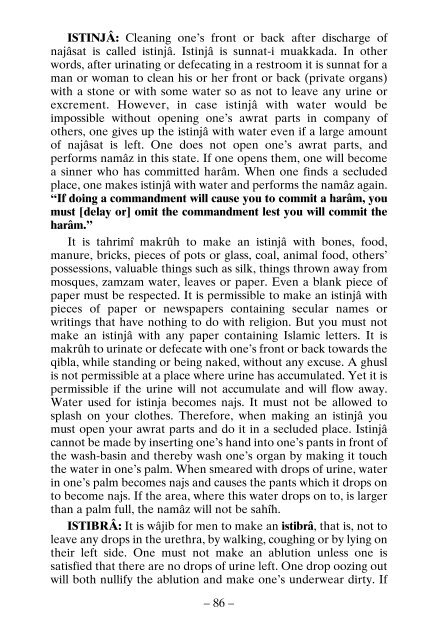Book of Namaz
You also want an ePaper? Increase the reach of your titles
YUMPU automatically turns print PDFs into web optimized ePapers that Google loves.
ISTINJÂ: Cleaning one’s front or back after discharge <strong>of</strong><br />
najâsat is called istinjâ. Istinjâ is sunnat-i muakkada. In other<br />
words, after urinating or defecating in a restroom it is sunnat for a<br />
man or woman to clean his or her front or back (private organs)<br />
with a stone or with some water so as not to leave any urine or<br />
excrement. However, in case istinjâ with water would be<br />
impossible without opening one’s awrat parts in company <strong>of</strong><br />
others, one gives up the istinjâ with water even if a large amount<br />
<strong>of</strong> najâsat is left. One does not open one’s awrat parts, and<br />
performs namâz in this state. If one opens them, one will become<br />
a sinner who has committed harâm. When one finds a secluded<br />
place, one makes istinjâ with water and performs the namâz again.<br />
“If doing a commandment will cause you to commit a harâm, you<br />
must [delay or] omit the commandment lest you will commit the<br />
harâm.”<br />
It is tahrimî makrûh to make an istinjâ with bones, food,<br />
manure, bricks, pieces <strong>of</strong> pots or glass, coal, animal food, others’<br />
possessions, valuable things such as silk, things thrown away from<br />
mosques, zamzam water, leaves or paper. Even a blank piece <strong>of</strong><br />
paper must be respected. It is permissible to make an istinjâ with<br />
pieces <strong>of</strong> paper or newspapers containing secular names or<br />
writings that have nothing to do with religion. But you must not<br />
make an istinjâ with any paper containing Islamic letters. It is<br />
makrûh to urinate or defecate with one’s front or back towards the<br />
qibla, while standing or being naked, without any excuse. A ghusl<br />
is not permissible at a place where urine has accumulated. Yet it is<br />
permissible if the urine will not accumulate and will flow away.<br />
Water used for istinja becomes najs. It must not be allowed to<br />
splash on your clothes. Therefore, when making an istinjâ you<br />
must open your awrat parts and do it in a secluded place. Istinjâ<br />
cannot be made by inserting one’s hand into one’s pants in front <strong>of</strong><br />
the wash-basin and thereby wash one’s organ by making it touch<br />
the water in one’s palm. When smeared with drops <strong>of</strong> urine, water<br />
in one’s palm becomes najs and causes the pants which it drops on<br />
to become najs. If the area, where this water drops on to, is larger<br />
than a palm full, the namâz will not be sahîh.<br />
ISTIBRÂ: It is wâjib for men to make an istibrâ, that is, not to<br />
leave any drops in the urethra, by walking, coughing or by lying on<br />
their left side. One must not make an ablution unless one is<br />
satisfied that there are no drops <strong>of</strong> urine left. One drop oozing out<br />
will both nullify the ablution and make one’s underwear dirty. If<br />
– 86 –

















